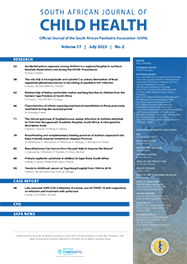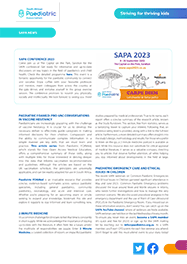Research

Bilateral Wilms’ tumour: A ten-year experience of two academic centres in Johannesburg
Abstract
Background. Nephroblastoma is the most common paediatric renal malignancy, affecting 1 in 10 000 children worldwide. Between 5% and 10% present bilaterally.
Objective. To review two centre’s experience of bilateral Wilms’ tumour in order to improve future management practices.
Methods. This was a retrospective case review of nephroblastomas treated at the Chris Hani Baragwanath and Charlotte Maxeke academic hospitals from 1 January 2003 to 31 December 2013.
Results. Eighteen patients (8.04%) presented with bilateral disease and were younger than those with unilateral disease. Three patients presented with metachronous disease at a median age of 23 months; initial presentation was at a median age of 2 months. The remaining 15 patients presented with synchronous disease at a median age of 27 months. Treatment followed aspects of the SIOP 9 protocol. Two patients died before surgery. Thirteen kidneys were removed. Twelve patients underwent nephron-sparing surgery, with microscopically positive resection margins seen in six kidneys post surgery. Two patients with residual microscopic disease relapsed. Three kidneys demonstrated unfavourable histology. Nephroblastomatosis was identified in one kidney. Eight patients were alive and disease free and three were alive with disease. An overall and disease-free survival rate of 66.67% and 55.56%, respectively, was found for this cohort. Neither age >2 years nor metachronous disease was associated with a poorer prognosis.
Conclusion. Bilateral nephroblastoma is a complex disease. The majority of patients in this series presented with advanced local disease. Relapse was more commonly influenced by the presence of microscopically positive margins than metastatic disease at presentation.
Authors' affiliations
Z Solomon, Department of Paediatric Surgery, Chris Hani Baragwanath Academic Hospital and the School of Clinical Medicine, University of the Witwatersrand, Johannesburg, South Africa
A Withers, Department of Paediatric Surgery, Chris Hani Baragwanath Academic Hospital and the School of Clinical Medicine, University of the Witwatersrand, Johannesburg, South Africa
T Govender, Department of Paediatric Surgery, Chris Hani Baragwanath Academic Hospital and the School of Clinical Medicine, University of the Witwatersrand, Johannesburg, South Africa
J Poole, Department of Paediatric Oncology and Haematology, Charlotte Maxeke Johannesburg Academic Hospital and the School of Clinical Medicine, University of the Witwatersrand, Johannesburg, South Africa
R Wainwright, Department of Paediatric Oncology and Haematology, Charlotte Maxeke Johannesburg Academic Hospital and the School of Clinical Medicine, University of the Witwatersrand, Johannesburg, South Africa
G Candy, Research Department, Chris Hani Baragwanath Academic Hospital and the School of Clinical Medicine, University of the Witwatersrand, Johannesburg, South Africa
J Loveland, Department of Paediatric Surgery, Chris Hani Baragwanath Academic Hospital and the School of Clinical Medicine, University of the Witwatersrand, Johannesburg, South Africa
Full Text
Cite this article
Article History
Date published: 2021-04-30
Article Views
Full text views: 629

.jpg)



Comments on this article
*Read our policy for posting comments here